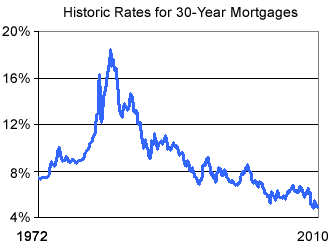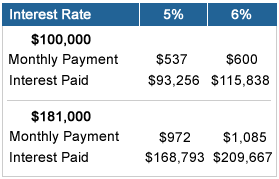Everyone understands a higher interest rate on a mortgage means you'll pay more money over time to own your home. But few understand just how large a difference small changes in your mortgage rate can mean. So if you're considering buying or refinancing a home, paying attention to this article could help save you tens of thousands of dollars.
Low Interest Rates Make Home Buying More Attractive
For most, buying a home is the largest purchase they'll make in a lifetime. It's no surprise, then, that roughly 70% of homes in the U.S. carry a mortgage to make home buying easier to budget. And according to the Federal Reserve Bank of Kansas City, the average mortgage balance is over $181,000.

You see, the last several years have been a period of abnormally low rates. But the worry now is that mortgage rates have nowhere to go but up. The Federal Reserve has cut the federal funds rate to zero and interest rateen bought mortgage-backed securities to help lower mortgage rates and revive a slumping housing market.
But with a recovery starting to take hold, the consensus is that The Fed will draw back its expensive and unprecedented support. At the very least, the Federal Reserve won't cut the funds rate (which impacts other interest rates) to below zero.
And that means mortgage rates are likely to rise in the coming months.
The BIG Cost of Small Changes
So what does that mean for you? If you have locked in your mortgage rate via a 'fixed' loan, it won't mean anything -- your interest rate and payments will stay the same. However, if you're looking to buy a home, your mortgage rate is variable, or you're looking to refinance, rising rates could mean costs of tens of thousands of dollars.
To keep things simple, let's take a look at an example using a mortgage with a principal balance of $100,000 (well below the national average). If you locked in this amount with a 30-year fixed-rate mortgage at the current 5% rate, you'd have done well by historical standards.
Your monthly payments would be about $537. But even at that low rate, you'd pay more than $93,000 in interest over the life of the loan!
[Click here to use our Mortgage Calculator to calculate the principal and interest payment on a fixed-rate mortgage.]
But what if the interest rate rises, even a little bit? Say your loan was the exact same, except it was at 6% interest (still a good rate by historical standards). In this case, the monthly payment rises to $600, while the interest paid over the life of the loan increases to $116,000. In other words, this small rise in the mortgage rate ends up costing nearly $23,000 extra in interest.

Here you'd have monthly payments of $972 and pay $169,000 in interest over the life of the loan. Our same increase to a 6% interest rate would lead to a rise in the monthly payment to $1,085 -- an increase of more than $100 a month. Meanwhile, interest paid over the life of the loan rises to a staggering $210,000, a figure of $41,000 more than with a 5% loan -- enough to buy a luxury automobile along with your home.
There is no telling where mortgage rates will be in the coming months and years. However, given that the unprecedented effort from the U.S. government to keep rates low has to end, the consensus is that rates will rise in the future.
So if you're looking to buy a home or refinance a mortgage, you might want to take advantage of today's low rates. And if you don't? You can always save more for a down payment -- thereby lowering the amount of your mortgage and offsetting the effects of rising rates.
[If you're ready to buy a home, use our Mortgage Calculator to see what your monthly principal and interest payment will be.]



